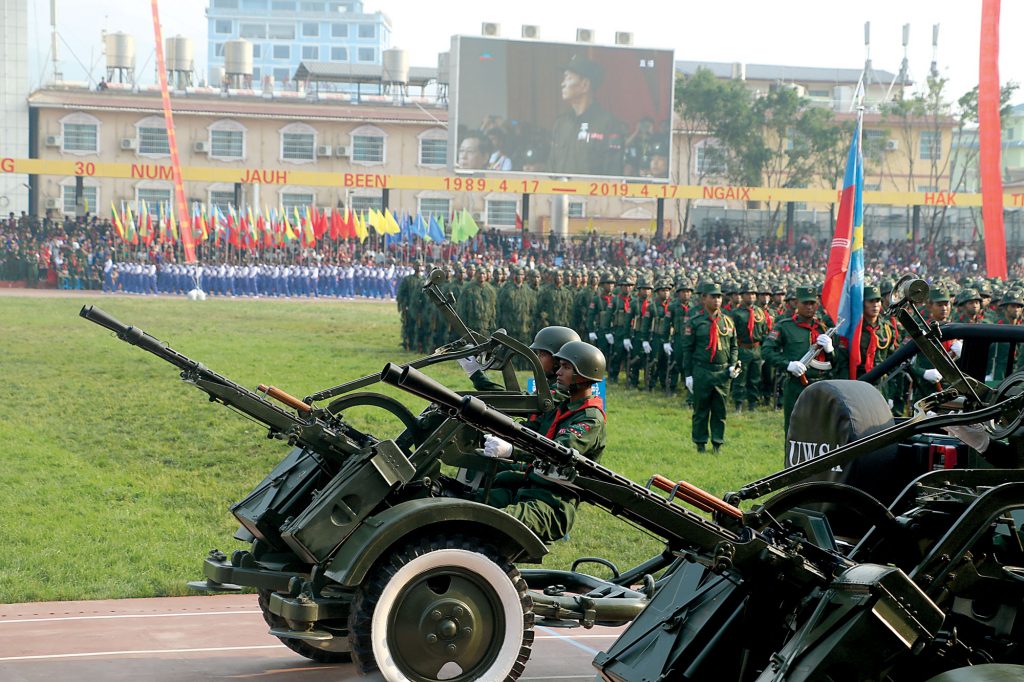[ The Irrawaddy ] Silence on Coup Makes Strategic Sense for Myanmar’s Wa
On March 25, 10 Wa civil society organizations, among them the Tang-yan Wa Youth Network, university students from the Wa Christian Fellowship and the Wa Women’s Network, sent an open letter to the UWSP/UWSA leadership urging them to say something about the killings and to publicize their stand on the movement for federal democracy. That hasn’t happened, though, and the issue at stake is the UWSA’s close relationship with the security services across the border in China. Those agencies do not want to get involved with any movement that wants to overthrow the coup-installed government in Naypyitaw—and the UWSA is an ally in China’s geostrategic quest for dominance in Myanmar and beyond. Put in plain words, China’s support for the UWSA gives Beijing leverage inside Myanmar, the only neighboring country that provides China with easy and convenient access to the Indian Ocean.
When Aung Min, then president’s office minister in the Thein Sein administration, visited Monywa, a town northwest of Mandalay, in November 2012 to meet local people protesting a controversial Chinese-backed copper mining project in the area, he openly admitted: “We are afraid of China…we don’t dare to have a row with [them]. If they feel annoyed with the shutdown of their projects and resume support to the communists, the economy in the border areas would backslide. So you’d better think seriously.” By “the communists” he clearly meant the UWSA and its allies, offshoots of the once China-supported Communist Party of Burma’s (CPB) powerful army, which collapsed after a mutiny among its hilltribe—mainly Wa—rank-and-file in 1989. And he was right. In fact, the UWSA, which like the old CPB is supported by China, has become even stronger and better equipped than the old party ever was.
The UWSA’s strength—and the scope of its arsenal—was demonstrated on April 17, 2019, when it celebrated the 30th anniversary of the mutiny against the elderly, orthodox Marxist-Leninist and mainly Burman leadership of the CPB. The CPB with its increasingly anachronistic policies had lost its importance to the Chinese, who are now more interested in exporting consumer goods than Maoist-style revolutions. The old CPB leaders were allowed to retire in China, and the UWSA and three other components of the erstwhile CPB were born. Those four former CPB forces also entered into ceasefire agreements with the then junta, the State Law and Order Restoration Council, which suited China’s interests as well.
On that day, a bit over two years ago, thousands of Wa soldiers in impeccable uniforms goose-stepped in perfect formation past the grandstand where their leaders stood at attention. Then came an impressive display of surface-to-air missiles, heavy artillery, mortars, rocket launchers, machine guns, assault rifles, armored personnel carriers and even a weaponized drone. Columns of civilians, mostly Wa tribesmen but also people from other ethnic groups from the over 30,000-square-km area that the UWSA controls along the Chinese border and in the south near Thailand, made their way to the parade grounds. Spectacular fireworks lit up the sky after dark and people cheered and danced through the night.

But China, almost the sole supplier of weaponry to the UWSA, wants it to be strong enough to deter the Myanmar military, the Tatmadaw, from even trying to bring its base area under central control. As Aung Min inadvertently admitted, the UWSA has become exactly what the Chinese want: a useful bargaining chip when they want to put pressure on the Myanmar government to get economic concessions.
There is no doubt that the Wa’s dependence on China is real and overwhelming, militarily as well as economically. Apart from being equipped with Chinese-made weaponry, the Chinese yuan, not the Myanmar kyat, is the preferred currency in the area under UWSA control. People are connected to Chinese mobile phone and internet providers, and petrol and diesel come from China, as do medical supplies and most of the food. Furthermore—and this has escaped the attention of the outside world—the UWSA-controlled area is the only part of Myanmar where nearly everyone has been vaccinated against COVID-19. Supplies and even many of the medics administering the vaccine came from Yunnan, across the border.
Since the 1989 mutiny, the UWSA has built up what amounts to a well-organized, de facto self-governing state between Myanmar and China with its own administrative offices, courts, hospitals and schools. It may be argued that a lot of the wealth that has made this possible comes from the trade in narcotics—first opium and heroin and then methamphetamine—and that is something the Wa leadership cannot hide or escape from. Today, other sources of income exist, such as tin and rare earth metals.
But the way forward, for the Wa and the rest of Myanmar, would have to take into account the unique history of the Wa, and the fact that they have never been ruled by any central authority. Before independence, colonial presence in the area was limited to occasional flag marches up to what the British perceived as the border with China. Then, in the 1950s and well into the 1960s, KMT warlords and local chieftains ruled the Wa Hills. That was the case until the early 1970s, when the CPB took over the entire border area, including the Wa Hills. And after the 1989 mutiny, of course, the UWSP/UWSA became the new governing body.

